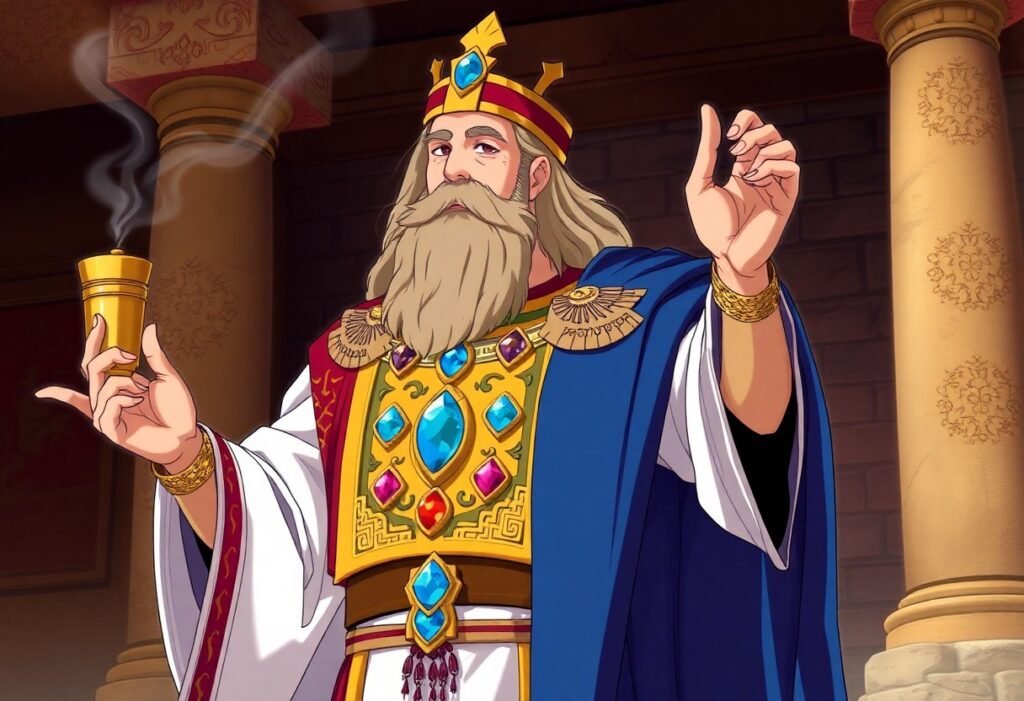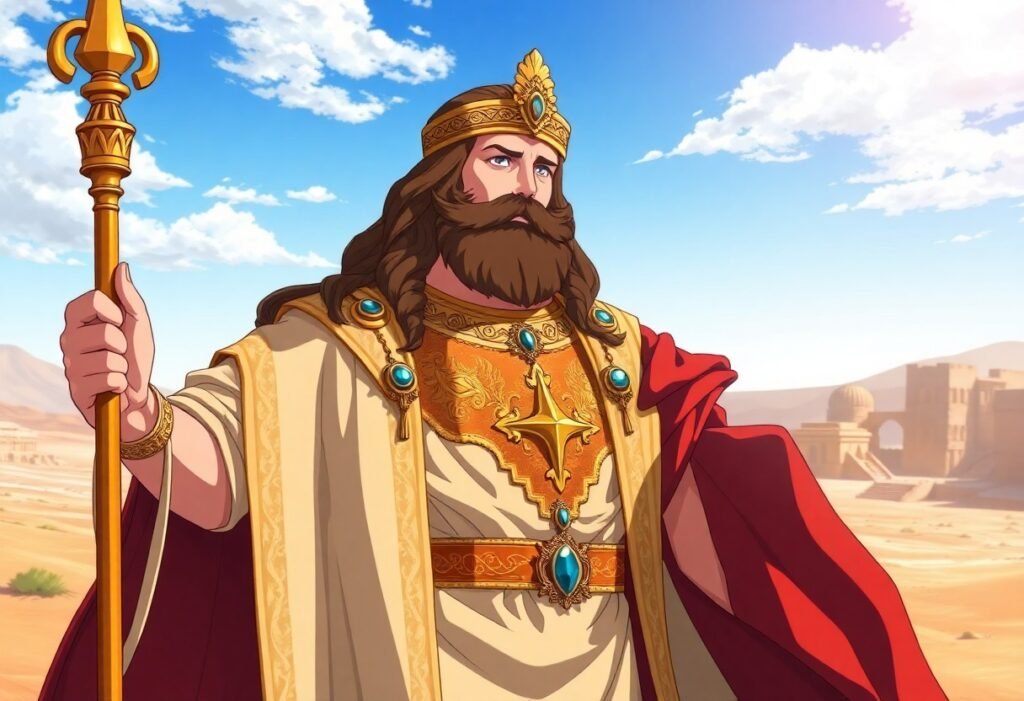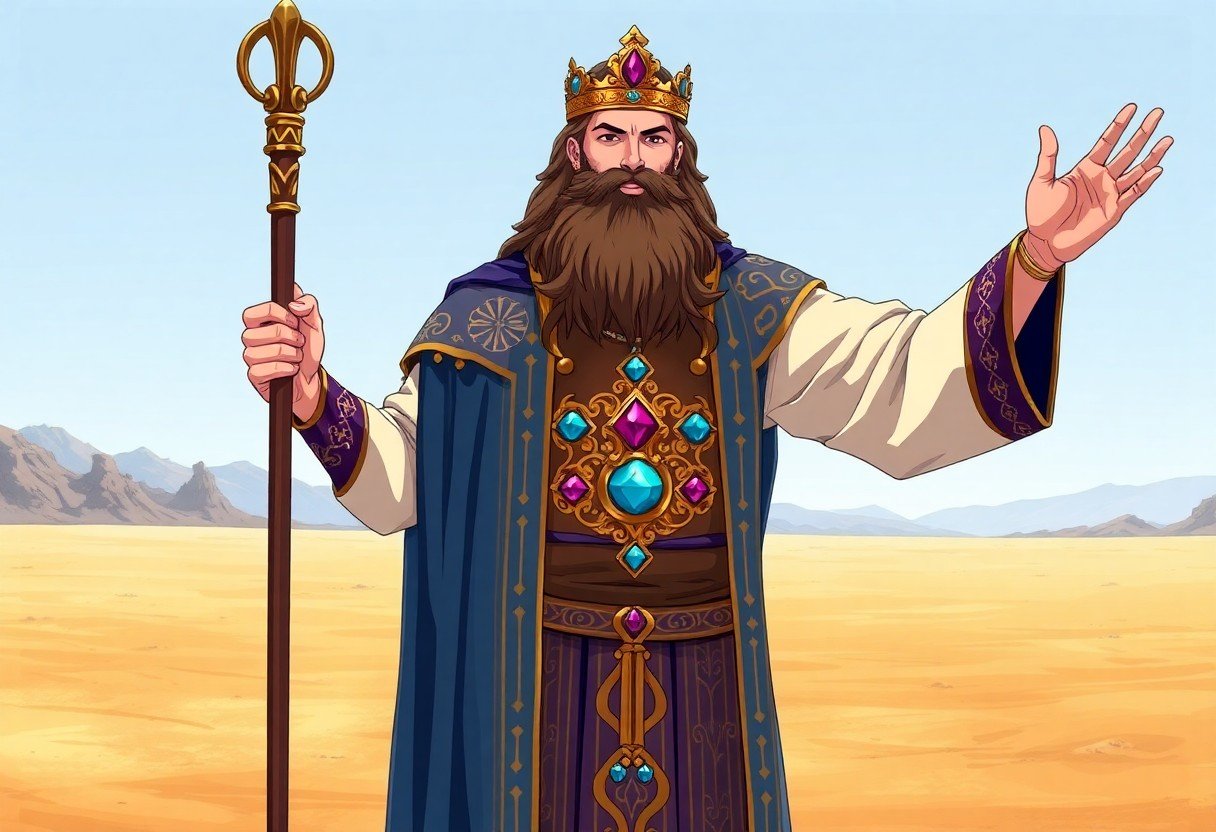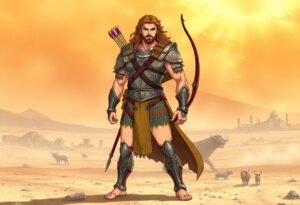Aaron, the older brother of Moses, is a significant figure in the Bible, known as Israel’s first high priest and a key leader during the Israelites’ exodus from Egypt. His story is intertwined with that of his brother Moses, and together they led the Israelites out of slavery and toward the Promised Land. Aaron’s role as a mediator between God and the people of Israel made him essential in establishing the priesthood and the sacrificial system described in the Book of Leviticus. His name, Aaron, means “exalted” or “high mountain,” reflecting his elevated role in Israel’s religious life.
Biblical Story
Aaron first appears in the Bible in the Book of Exodus when God chooses him to be Moses’ spokesperson. Moses, reluctant to speak before Pharaoh due to his own perceived shortcomings, was assured by God that Aaron would assist him. Aaron became Moses’ mouthpiece, communicating God’s demands to Pharaoh, including the command to let the Israelites go:
“And the anger of the LORD was kindled against Moses, and he said, Is not Aaron the Levite thy brother? I know that he can speak well. And also, behold, he cometh forth to meet thee: and when he seeth thee, he will be glad in his heart. And thou shalt speak unto him, and put words in his mouth: and I will be with thy mouth, and with his mouth, and will teach you what ye shall do. And he shall be thy spokesman unto the people: and he shall be, even he shall be to thee instead of a mouth, and thou shalt be to him instead of God.”
(Exodus 4:14-16)
Aaron played a significant role in performing miracles during the plagues in Egypt. He stretched out his staff to bring about the plagues of frogs, gnats, and boils, demonstrating God’s power before Pharaoh. After the Israelites were delivered from Egypt, Aaron continued to serve as Moses’ right-hand man, assisting in leading the people through the wilderness.
Aaron’s most important role, however, was as the first high priest of Israel. In the Book of Leviticus, Aaron and his sons were consecrated as priests, and he was given the responsibility of making sacrifices on behalf of the people. This included the Day of Atonement (Yom Kippur), where Aaron would enter the Most Holy Place to offer sacrifices for the sins of the nation:
“And the LORD said unto Moses, Speak unto Aaron thy brother, that he come not at all times into the holy place within the vail before the mercy seat, which is upon the ark; that he die not: for I will appear in the cloud upon the mercy seat. Thus shall Aaron come into the holy place: with a young bullock for a sin offering, and a ram for a burnt offering.”
(Leviticus 16:2-3)
Despite his high position, Aaron was not without fault. One of his most notable failures occurred during the incident of the golden calf. While Moses was on Mount Sinai receiving the Ten Commandments, Aaron yielded to the people’s demands and fashioned an idol, a golden calf, for them to worship. This act of disobedience brought God’s wrath upon the Israelites, but Aaron was spared, and he continued to serve as high priest:
“And when the people saw that Moses delayed to come down out of the mount, the people gathered themselves together unto Aaron, and said unto him, Up, make us gods, which shall go before us; for as for this Moses, the man that brought us up out of the land of Egypt, we wot not what is become of him. And Aaron said unto them, Break off the golden earrings, which are in the ears of your wives, of your sons, and of your daughters, and bring them unto me. And all the people brake off the golden earrings which were in their ears, and brought them unto Aaron. And he received them at their hand, and fashioned it with a graving tool, after he had made it a molten calf: and they said, These be thy gods, O Israel, which brought thee up out of the land of Egypt. And when Aaron saw it, he built an altar before it; and Aaron made proclamation, and said, To morrow is a feast to the LORD. And they rose up early on the morrow, and offered burnt offerings, and brought peace offerings; and the people sat down to eat and to drink, and rose up to play.”
(Exodus 32:1-6)
Aaron’s life concluded just before the Israelites entered the Promised Land. Because of his involvement in Moses’ disobedience at the waters of Meribah, where they struck the rock instead of speaking to it as God commanded, Aaron was not allowed to enter the Promised Land. He died on Mount Hor, and his priestly garments were passed on to his son, Eleazar:
“Aaron shall be gathered unto his people: for he shall not enter into the land which I have given unto the children of Israel, because ye rebelled against my word at the water of Meribah. Take Aaron and Eleazar his son, and bring them up unto mount Hor: And strip Aaron of his garments, and put them upon Eleazar his son: and Aaron shall be gathered unto his people, and shall die there. And Moses did as the LORD commanded: and they went up into mount Hor in the sight of all the congregation. And Moses stripped Aaron of his garments, and put them upon Eleazar his son; and Aaron died there in the top of the mount: and Moses and Eleazar came down from the mount.”
(Numbers 20:24-28)

Character Traits
Aaron’s story highlights his faithfulness, leadership, and humanity. As Moses’ older brother, Aaron showed great loyalty, supporting Moses in his divine mission and helping lead the Israelites out of Egypt. His role as a spokesman and miracle worker during the plagues demonstrated his ability to follow God’s instructions and serve alongside his brother in times of crisis.
Aaron also exhibited humility in accepting his priestly duties. As the first high priest, Aaron stood between God and the people, offering sacrifices and performing rituals on their behalf. His position required both reverence for God’s holiness and compassion for the people’s sinfulness.
However, Aaron’s humanity is also evident in his mistakes. His involvement in the golden calf incident and his later failure at Meribah show that, despite his high calling, Aaron was susceptible to the pressures of leadership and the desires of the people. These episodes reflect both his weakness and his capacity for growth, as God continued to use him despite his failures.
Spiritual Lessons
Aaron’s life offers several key spiritual lessons, particularly regarding leadership, obedience, and the role of a mediator. One of the central lessons from Aaron’s story is the importance of obedience to God’s commands, especially in positions of leadership. As high priest, Aaron was entrusted with sacred duties, and his actions had significant consequences for the people of Israel. His mistakes, like the golden calf and Meribah, remind us of the weight of responsibility that comes with spiritual leadership.
Another important lesson from Aaron’s life is the necessity of repentance and restoration. Despite his role in the golden calf incident, Aaron was not cast aside by God. Instead, he continued to serve as high priest, demonstrating that God offers forgiveness and second chances even to those in leadership. This teaches us about the importance of humility and seeking God’s forgiveness when we fall short.
Aaron’s role as high priest also points to the need for a mediator between God and humanity. His work in offering sacrifices for the people foreshadows the ultimate mediation and sacrifice that would come through Jesus Christ, the true and eternal high priest:
“Seeing then that we have a great high priest, that is passed into the heavens, Jesus the Son of God, let us hold fast our profession. For we have not an high priest which cannot be touched with the feeling of our infirmities; but was in all points tempted like as we are, yet without sin. Let us therefore come boldly unto the throne of grace, that we may obtain mercy, and find grace to help in time of need.”
(Hebrews 4:14-16)
Relationship with God
Aaron’s relationship with God was one of deep reverence, as he served in the sacred role of high priest. As the intermediary between God and the Israelites, Aaron performed rituals and sacrifices that allowed the people to atone for their sins and maintain a relationship with God. His consecration as high priest, along with the detailed instructions God gave for his priestly garments and duties, shows the holiness of his calling:
“And Moses brought Aaron and his sons, and washed them with water. And he put upon him the coat, and girded him with the girdle, and clothed him with the robe, and put the ephod upon him, and he girded him with the curious girdle of the ephod, and bound it unto him therewith. And he put the breastplate upon him: also he put in the breastplate the Urim and the Thummim. And he put the mitre upon his head; also upon the mitre, even upon his forefront, did he put the golden plate, the holy crown; as the LORD commanded Moses.”
(Leviticus 8:6-9)
Despite his high status, Aaron’s relationship with God was marked by moments of weakness and repentance. His failure in the golden calf incident revealed a lapse in judgment, yet God’s continued use of Aaron demonstrates His mercy and grace. Aaron’s life shows that even those called to the highest levels of spiritual leadership must remain humble and dependent on God’s forgiveness.
Aaron’s role also involved a deep sense of responsibility, as he was the one to enter the Most Holy Place on behalf of the people, especially on the Day of Atonement. This sacred responsibility reflected his unique relationship with God, as he was entrusted with maintaining the purity of the covenant relationship between God and Israel.

Psalm 56:3
49.99$Impact on Biblical History
Aaron’s impact on biblical history is immense, particularly in his role as the first high priest of Israel. His priesthood set the foundation for the Levitical priesthood, which continued for generations as the priests, descended from Aaron, were responsible for maintaining the sacrificial system and the worship of God in the Tabernacle and, later, the Temple.
Aaron’s legacy also extends to the importance of the Day of Atonement (Yom Kippur), a central practice in Jewish worship that continues to be observed today. As the high priest, Aaron’s duties on this day of repentance and atonement symbolized the need for reconciliation with God, a theme that continues throughout the Bible.
In the New Testament, Aaron’s priesthood is seen as a precursor to the eternal priesthood of Jesus Christ. The author of Hebrews contrasts Aaron’s temporary and imperfect priesthood with the perfect priesthood of Jesus, who offers a final and complete sacrifice for sin:
“If therefore perfection were by the Levitical priesthood, (for under it the people received the law,) what further need was there that another priest should rise after the order of Melchisedec, and not be called after the order of Aaron? For the priesthood being changed, there is made of necessity a change also of the law.”
(Hebrews 7:11-12)

Symbolism and Foreshadowing
Aaron’s life is filled with symbolism and foreshadowing, particularly in his role as high priest. As the mediator between God and Israel, Aaron’s work in offering sacrifices prefigures the ultimate work of Jesus Christ, who serves as the eternal high priest for all believers. Just as Aaron entered the Most Holy Place with the blood of atonement, Jesus entered the heavenly sanctuary to offer His own blood for the sins of the world:
“But Christ being come an high priest of good things to come, by a greater and more perfect tabernacle, not made with hands, that is to say, not of this building; Neither by the blood of goats and calves, but by his own blood he entered in once into the holy place, having obtained eternal redemption for us.”
(Hebrews 9:11-12)
The priestly garments worn by Aaron also hold symbolic meaning. The breastplate with twelve stones represented the twelve tribes of Israel, signifying Aaron’s role in bearing the people before God. The golden plate on his forehead, inscribed with “HOLY TO THE LORD,” symbolized the holiness required of the high priest in his service to God:
“And thou shalt make a plate of pure gold, and grave upon it, like the engravings of a signet, HOLINESS TO THE LORD. And thou shalt put it on a blue lace, that it may be upon the mitre; upon the forefront of the mitre it shall be. And it shall be upon Aaron’s forehead, that Aaron may bear the iniquity of the holy things, which the children of Israel shall hallow in all their holy gifts; and it shall be always upon his forehead, that they may be accepted before the LORD.”
(Exodus 28:36-38)
Modern-Day Application
Aaron’s story offers important lessons for modern believers, especially in the areas of leadership, obedience, and intercession. As spiritual leaders, we are called to serve with humility, integrity, and a deep reverence for God’s holiness. Aaron’s mistakes remind us that even leaders can fall short, but God’s grace allows for restoration and continued service.
Aaron’s role as high priest also challenges us to consider the ways we can intercede for others. His work in offering sacrifices on behalf of the people mirrors our responsibility to pray for those in need and seek reconciliation in our relationships. Just as Aaron stood between God and Israel, we are called to stand in the gap for others through prayer and acts of service.
Finally, Aaron’s priesthood points us to the ultimate sacrifice of Jesus Christ, the true high priest. As we reflect on Aaron’s story, we are reminded of the completeness of Christ’s work on the cross, which offers forgiveness and reconciliation with God for all who believe.
Interesting Facts
- Aaron was three years older than his brother Moses (Exodus 7:7).
“And Moses was fourscore years old, and Aaron fourscore and three years old, when they spake unto Pharaoh.”
(Exodus 7:7)
- Aaron’s rod, which budded and produced almonds, became a sign of his divine appointment as high priest (Numbers 17:8).
“And it came to pass, that on the morrow Moses went into the tabernacle of witness; and, behold, the rod of Aaron for the house of Levi was budded, and brought forth buds, and bloomed blossoms, and yielded almonds.”
(Numbers 17:8)
- Aaron’s descendants, known as the Aaronic priesthood, continued to serve as priests for centuries, with the Levitical priesthood playing a central role in Israel’s worship practices.
- Aaron died at 123 years old on Mount Hor, and his priestly garments were passed on to his son Eleazar (Numbers 33:39).
“And Aaron was an hundred and twenty and three years old when he died in mount Hor.”
(Numbers 33:39)
Reflection Questions
- How does Aaron’s role as high priest challenge you to think about your own responsibilities in spiritual leadership or service?
- What lessons can you learn from Aaron’s mistakes, such as his involvement in the golden calf incident?
- How does Aaron’s priesthood foreshadow the work of Christ, and how can this deepen your understanding of Jesus as the ultimate high priest?
Conclusion
Aaron’s life is a powerful story of leadership, intercession, and God’s grace. As Israel’s first high priest, Aaron played a critical role in establishing the nation’s worship practices and maintaining their covenant relationship with God. His story teaches us about the importance of obedience, the responsibility of spiritual leadership, and the grace that God extends to those who serve Him, even when they falter. Ultimately, Aaron’s priesthood points us to Jesus Christ, the true and eternal high priest, whose sacrifice offers redemption and reconciliation for all. As we reflect on Aaron’s journey, may we be inspired to serve God with humility, integrity, and a heart for intercession.








